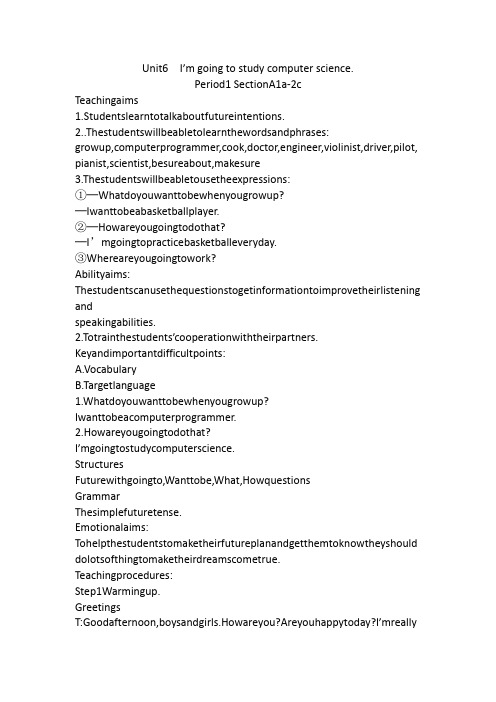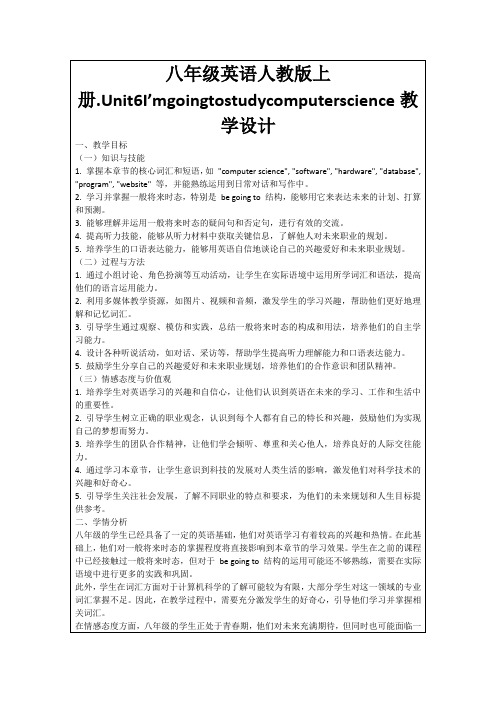【英语】人教八年级上册Unit 6 I'm going to study computer scienceUnit6 Section B1 (1a
人教八年级英语上册unit6 I'm going to study computer science

Unit6 I’m going to study computer science.知识点一、课本基础知识归纳1.grow up成长;长大2.be sure about对……有把握3.make sure确信;务必4.send…to…把……送到……5.be able to do sth 能够做某事=can+动词原形6.the meaning of……的意思7.different kinds of不同种类的 a kind of一种8.write down写下;记下9. for example例如10.take up开始做;学着做11. take lessons上课12.try one’s best尽最大努力13.move to +地点搬到…14. get good grades取得好成绩15.make resolutions制定决心16.get lots of exercise 多锻炼17.learn another foreign language 再学一门外语18. sound like 听起来像19. at the beginning of 在…开始时20.eat less fast food 少吃快餐21.have to do with与…有关系have nothing to do with 与…无关22.make a weekly plan 制订每周的计划23.for this reason 为此24. too…to…太……而不能……25.agree with sb 同意某人的观点26.have one thing in common 有一点相同27.be going to+动词原形打算做某事28.practice doing练习做某事29.keep on doing sth.不断地做某事,keep+sth+adj使某物保持……30.learn to do sth.学会做某事31.finish doing sth.做完某事32.promise to do sth.许诺去做某事33.help sb. to do sth.帮助某人做某事34.remember to do sth.记得做某事35.agree to do sth.同意做某事二、重要知识点讲解1.practice (doing) sth练习(做)某事He is going to practice (playing) basketball every day. 拓展:常用-ing形式作宾语的动词口诀:2. keep的用法①keep+n.遵守…We should keep a promise/our words.②keep+adj.保持…He keeps healthy/quiet.③keep+n+adj.使…保持…We should keep the classroom clean.④keep doing sth.一直(持续)做某事My classmates told me to keep going.⑤keep sb doing sth使…一直做某事Don’t keep me waiting too lo ng.⑥keep on doing sth.不断做某事I’m goi ng to keep on writing stories.⑦keep/stop sb from doing sth阻止…做某事We should keep people from cutting down trees.3. be sure①be sure of/about sth对…有把握He is sure of living to 90.他有把握/自信能活到90岁。
英语人教版八年级上册Unit6 I’m going to study comp

Unit6 I’m going to study computer science.Period1 SectionA1a-2cTeachingaims1.Studentslearntotalkaboutfutureintentions.2..Thestudentswillbeabletolearnthewordsandphrases:growup,computerprogrammer,cook,doctor,engineer,violinist,driver,pilot, pianist,scientist,besureabout,makesure3.Thestudentswillbeabletousetheexpressions:①─Whatdoyouwanttobewhenyougrowup?─Iwanttobeabasketballplayer.②─Howareyougoingtodothat?─I’mgoingtopracticebasketballeveryday.③Whereareyougoingtowork?Abilityaims: Thestudentscanusethequestionstogetinformationtoimprovetheirlistening andspeakingabilities.2.Totrainthestudents’cooperationwiththeirpartners. Keyandimportantdifficultpoints:A.VocabularyB.Targetlanguage1.Whatdoyouwanttobewhenyougrowup? Iwanttobeacomputerprogrammer.2.Howareyougoingtodothat?I’mgoingtostudycomputerscience.StructuresFuturewithgoingto,Wanttobe,What,HowquestionsGrammarThesimplefuturetense.Emotionalaims: Tohelpthestudentstomaketheirfutureplanandgetthemtoknowtheyshould dolotsofthingtomaketheirdreamscometrue. Teachingprocedures:Step1Warmingup.GreetingsT:Goodafternoon,boysandgirls.Howareyou?Areyouhappytoday?I’mreallyhappythatwecanhaveaclassheretoday.First,canyoushowmeyourhands, clapitloudly.2.Enjoyavideoandchanttogether.T:Now,let’senjoyavideotogether.Clapyourhandstothemusicandchant together.Sowhatjobscanyouseefromthevideo?Canyoutellme?Doyouwant toknowanyotherjobs?Le t’sseetogether.Step2Presentation1.Doyouknowanyotherjobs?2.Canyouguessthesejobs?T:Ifyouknowtheanswer,pleasestandupquickly.Sayitloudly.3.Readthewords.Step3Workon1a.1.Readthewords.2.Doyouthinkthesejobsareinteresting?Whichjobdoyouthinkisthemost interesting?Whichjobdoyouthinkistheleastinteresting?3.Studentsanswer. Tobeacomputerprogrammeristhemostinteresting.Tobeabusdriveristhelea stinteresting.Step4Newlanguagepresentation.1.T:Whatdoyouwanttobewhenyougrowup?WhenIwasachild,Iwanted tobeatrader.Sowhataboutyou?Whatdoyouwanttobewhenyougrowup?2.Explain“growup”3.HelpSstoanswerit. ThenshowsomemorepicturestohelpSslearnprofessions2.T:Nowtakeoutapi eceofpaper.Thinkaboutyourdreamsandwriteyourdreamdownonthepaper.Sowh atdoyouwanttobewhenyougrowup?4.T:Doyouwanttomakeyourdreamcometrue?It’stimeforustohavea game.“Tryyourluck.”Takeoutthepaper,foldit.Thentrytothrowintothebox. Ifyouthrowintoit,yourdreammaybecometrue.Sayoutyourdreamloudly. Iwillcallsomeofyoutocometothestagetotryyourluck,anyvolunteers? Asko therSs,letthemanswer”Whatdoeshe/shewanttobewhenhe/shegrows up?”.5.T:ButHowareyougoingtodothatifyouwanttobeateacherwhenyougrowup ?Let’sanswertogether.Boysaskgirlsanswer.6.Howisshe/hegoingtodothat?Step5Pairwork.T:NowIwanttoknowsomethingaboutyou?Whatdoyouwanttobewhenyoug rowup?Howareyougoingtodothat?Anexample:-Whatdoyouwanttobewhenyougrowup?--Iwanttobea/an…--Howareyougoingtodothat?--I’mgoingto…--Whatdoeshe/shewanttobewhenhe/shegrowsup?--He/Shewantstobea/ an…--Howishe/shegoingtodothat?--He/Sheisgoingto…T:Nowit’stimeforyoutotalkwithyourdeskmates.Oneasksandoneanswers. Step6Workon1b.1.T:Weknowourplans,doyouwanttoknowotherSs’plans?Nowopenyourboo ks,let’sseethepicture,listentofourconversationsandanswerquestions.Youshould matchandfillintheblanks.Nowlet’scheck theanswers.2.Checktheanswers:Soinconversation1,whatdoesthegirlwanttode?Howisshegoingtodothat?3.T:Let’shavearelax,Iwanttotellyourastory.4.T:Iwantsomeofyoutotellthestoryagain.Canyou?Whowantstotry?Doyou wanttohaveatry?Step7Workon2a.2b..T:YouallknowXiaoWanzi’sstory.Thereisanotherboy,hisnameisChengHan.h ehasanotherstory,too.T:ChenHanhasafutureplan.Listen,WhatisChengHangoingtodo?Checkthecorrectboxesinthepicture.2.WhatareChengHan’splansforthefuture?Fillinthechart.3.Let’slistentogether.Let’schecktheanswers.Step8Makeasurvey.Doyouwanttoknowyourclassmates’plans.Nowlet’smakeasurveyaskyourcl assmates.ThreeSsagroup.ThenchooseoneStudenttomakeareporthere.Step9Summarizeandhomework.1.Today,youhavedoneaverygoodjob.Yourdreammaybecometrue.Butreme mberyoushouldworkveryhardandtakeactions,youwillbesuccessful.2.Summarize3.homework.。
初中英语人教版八年级上册Unit 6 I’m going to study com

Unit 6 I‟m going to study computer science.﹙The 1st period Section A 1a-2d﹚Ⅰ. Teaching aims1. Knowledge aims:1)words: grow up, computer programmer, cook, doctor, engineer, violinist, driver, pilot, pianist, scientist, be sure about, make sure .2)sentence patterns:①─What do you want to be when you grow up?─I want to be a basketball player.②─How are you going to do that?─I‟m going to practice basketball every day.③Where are you going to work?④When are you going to start?⑤I‟m not sure about that.2. Ability aims: Enable the Ss to use the sentence patterns to talk about their plans forfuture .3. Emotional aims: Let the Ss talk about their plans for future in order to make them study harder from now on and then achieve their aims.Ⅱ. Important and difficult points:Important points :words and phrases,target language and grammar.Difficult points: use “be going to “to talk about what they want to be when they grow up and how to achieve their aims.Ⅲ. Teaching methods: Situational Teaching Approach ; Audio-Lingual Approach Ⅳ. Teaching aids:Multimedia and CAIⅤ. Teaching steps:Step1. Warming-up1.Read the new words unit 6 section A.2.Daily greetingsStep 2 Presentation:1. Show some pictures about jobs(basketball,pianist,bus driver and so on)on the big screen to ask the students what he/she does.T:Look at this picture.What does he do?S:He is a .........2.After showing other people‟s jobs and then ask some students what they want to be when they grow up.T: What do you want to be when you grow up?S:I want to be... 通过一些职业场景的图片将学生带入my dream job话题,让学生进入主题学习的氛围通过图片展示,以旧带新,学习新词汇与表达,操练新句型,通3.Do a survey.Two Students a group to ask their partner what they want to be when they grow up.Step 3. Listening.1.Teacher ask the students if they want to be a teacher/doctor/an engineer and so on .How are they going to do that?There are four students in 1b talking about what their plans for future.2.Listen to the tape.3.Ask two students to read out the answers.(1b)4.Continue 2a./2b.Work on 2a.①Let Ss look at the pictures below.Explain the activities in thepictures if necessary.T:Look at this picture.Here is a boy named Cheng Han.Can you tell me what he is doing.S:Dreaming./Thinking about his future.……②Play the recording for the Ss to listen and check (√)the correct boxes in the picture.work on 2b.①Let Ss read the chart below .Tell Ss that they‟ll listen to Cheng Han‟s plan for the future.“What” means “What does Cheng Han want to be?”“Where”means “Where is Cheng Han going to work?”…How” means “How is he going to do it?”“When” means “When is he going to start?”②Play the recording for the Ss to fill in the blanks.③All the students to answer and spell them.Step 4 Pair work①Give a sample to the Ss .A:What do you want to be when you grow up?B:I want to be...A: How are you going to do that?B:I‟m going to ...A:Where are you going to work?B.I‟m going to work in...②Ss work in pairs to practice it.③Ask some students to act out their conversations.Step5 Role-play the conversation 2d.①Show some questions about it on the screen and let Ss think about them when listening to the tape.②Ss answer these questions.③T explains the dialogue .④The whole class read again.Ⅵ. SummarySentences pattern:--What are you going to be when you grow up?--I‟m going to be a/an...--How are you going to do that?--I‟m going to...Do some Exercises on the big screen.Ⅶ. Homework: 过两两对话的形式激发学生说话的兴趣播放课本录音,让学生体会目标语言在口语交际中的运用,为下一环节做好铺垫让学生根据自己的情况,两人一组谈谈未来的理想工作,提高了学生对所学知识的运用能力,增强学生学习的效果1.Recite the conversation in 2d after school.2.Write a short passage about your plan for the future, about 70 words.Ⅷ. The blackboard designSection A1 (1a-2d)Words:grow up, computer programmer, cook, doctor, engineer, violinist, driver, pilot, pianist, scientist, be sure about, make sureSentence structures:①─What do you want to be when you grow up?─I want to be a basketball player.②─How are you going to do that?─I‟m going to practice basketball every day.③Where are you going to work?④When are you going to start?⑤I‟m not sure about that.。
英语人教版八年级上册Unit6 I'm going to study comp

3. Play the recording again. Check the answers with the Ss.
4. Play the recording again. Ss listen and match the jobs with activities.
情感目标
树立目标,通过自己的努力实现理想
内容分析
重点
1)学习一般将来时态的构成方式。
2)学习本课时出现的重点句型,通过在不同情景下运用来熟练运用一般将来时态。
难点
用一般将来时态表达自己未来的打算。
教具
CAI
教学设计
师生活动
时间分配
Ⅰ. Lead-in
1.介绍自己小时候想要从事的职业,由此归纳出以前所学过的一些职业的英语表达方式:
教学目的
知识目标
1能掌握以下单词:grow up, computer programmer, cook, doctor, engineer, violinist, driver, pilot, pianist, scientist
2能掌握以下句型:
①─What do you want to be when you grow up?
1.T:Do you like watchingTV shows ormovies?
Do you want to be an actor or actress when you grow up?
What do you want to be when you grow up?
2.Look at the pictures and practice the conversations.
八年级英语人教版上册.Unit6I’mgoingtostudycomputerscience教学设计

-对于基础较好的学生,鼓励他们在口语表达和写作中运用更复杂的句子结构和高级词汇。
4.听力训练:通过听力练习,让学生熟悉一般将来时态在不同语境中的运用,提高他们的听力理解能力。
-播放关于青少年规划未来的访谈节目,让学生回答与计算机科学相关的问题。
4.鼓励学生:教师鼓励学生树立信心,努力学习英语,为实现自己的未来目标打下坚实基础。
五、作业布置
为了巩固本章节的学习内容,确保学生能够熟练掌握一般将来时态和计算机科学相关词汇,特布置以下作业:
1.写作任务:请学生撰写一篇关于自己未来职业规划的英文短文,要求使用一般将来时态,并至少包含5个本节课学习的计算机科学词汇。短文内容需包括以下要点:
3.教师指导:教师对学生的练习进行指导和反馈,帮助他们纠正错误,提高语言表达能力。
(五)总结归纳
1.教师总结:教师对本节课的重点内容进行回顾,强调一般将来时态的用法和计算机科学词汇的掌握。
2.学生反馈:学生分享自己在课堂中学到的知识和收获,以及在学习过程中遇到的困难和问题。
3.布置作业:教师布置与课程内容相关的作业,要求学生在课后进一步巩固所学知识。
三、教学重难点和教学设想
(一)教学重难点
1.语法重点:一般将来时态,特别是be going to结构的运用,以及疑问句和否定句的构成。
2.词汇重点:计算机科学相关词汇的掌握,如"computer science", "software", "hardware", "database", "program", "website"等。
英语人教版八年级上册Unit 6 I'm going to study ...

Unit 6 I’m going to study computer science.Section B 2b---- 2d Reading导学案教材分析:本节课是第六单元的第四课时,主要内容是阅读有关决定的短文。
通过学生自主阅读,完成Section B中2b、2c和2d中相应的任务,阅读内容共分3段,每段都围绕主题内容展开,有利于学生的阅读,但由于文章有一定的难度,还需要学生们课前做好生词和短语的预习工作。
学情分析:由于授课班级地处农村中学,学生的英语阅读能力和阅读技巧还存在困难,尤其是学困生更是害怕进行阅读训练,不能很好地完成学习任务。
所以本节课在阅读过程中,可以通过教师点拨,同伴互助,小组合作等方式共同完成阅读任务,让学生体验到学习的乐趣,同时培养学生的阅读技能,提高阅读能力从而达成学习目标。
Learning aims :1.通过skimming, scanning, careful reading,学生能够正确选择段落大意,并补全文章中的空缺内容。
2.通过careful reading,学生能够从文章中提取有效信息,正确回答问题,逐步提高阅读技巧和能力。
3.教师引导,学生能够找出文中的重点短语和句型,并通过翻译句子,单项选择,和挖空练习,能够学以致用,从而加深对原文理解。
Learning Key Points : 运用三步阅读法提高学生的阅读能力和解决问题的能力。
Learning Difficulties :掌握重点词汇、短语和句式有效完成阅读任务。
Teaching Methods: Reading guidance ; Pair work. Team workTeaching Aids: Learning paper A projector.Learning procedures:Step 1. Showing the learning aims .Ss read them.Step 2.Pr-readingTask: 1. 写出下列词汇、短语决定_________诺言___________改善________身体的_______自我提高_____________ 在…开始___________写下_________与...有关_______________学着做____________ Task: 2 :将方框中的四个句子放到文中适当的位置。
最新人教版英语八年级上Unit6 I'm going to study computer science

be sure about 确信;对„„有把握 e.g. Are you sure about the number? 你对数字有把握吗? make sure 确保;查明
e.g. Make sure you get there on time. 一定要确保准时到达那里。
Do you think these jobs are interesting? 1a Rank them [1-12](1 is most interesting, 12 is least interesting).
a doctor 1. People come to see me when they are sick. I can help to make them feel better.
What do they do?
2. I like singing and playing the guitar.
I act in different movies.
an actor/actress
3. I like sports and I practice basketball every day. a basketball player
4. I wear a uniform and I work to make our city a safe place. a policeman
What Where How Cheng Han is going to be a teacher. He is going to move to Shanghai. He is going to learn how to teach children.
He is going to finish high school When and college first.
- 1、下载文档前请自行甄别文档内容的完整性,平台不提供额外的编辑、内容补充、找答案等附加服务。
- 2、"仅部分预览"的文档,不可在线预览部分如存在完整性等问题,可反馈申请退款(可完整预览的文档不适用该条件!)。
- 3、如文档侵犯您的权益,请联系客服反馈,我们会尽快为您处理(人工客服工作时间:9:00-18:30)。
Section B 1 (1a-2e)一、教学目标:1. 语言知识目标:1) 能掌握以下单词:resolution, team, make the soccer team, foreign, able, be ableto, question, meaning, discuss, promise, beginning, at thebeginning of, improve, write down, physical, themselves,have to do with, self-improvement, take up, hobby, paint,weekly, schoolwork2) 能掌握以下句式结构:①─What are you going to do next year?─I’m going to take guitar lessons.② Many resolutions have to do with self-improvement.③They’re going to take up a hobby like painting.④ Sometimes the resolutions may be too difficult to keep.2. 情感态度价值观目标:每个人都有自己的梦想和对未来的打算,对于将来想要从事的职业也充满了憧憬。
通过学习这单元的内容学生们能够增强学习主动性和学习兴趣,并为实现自己的理想而不断努力。
二、教学重难点1. 教学重点:1) 掌握本课时出现的生词及表达方式。
2) 进行听力训练,提高综合听说能力。
3) 阅读短文,获得相关信息,提高学生们的综合阅读能力。
2. 教学难点1) 听力训练2) 阅读2b部分的短文并完成相关要求。
三、教学过程Ⅰ. Warming-up and revision1. Daily greeting. Check the homework.2. 头脑风暴:说出表示的职业名词teacher, nurse, doctor, actor, actress, runner, basketball player, pilot, waiter,computer programmer, pianist, scientist, violi nist…学生们可以小组为单位进行比赛,看谁写出来的最多。
(在五分钟内)3. 说理想,谈打算。
I want to be an engineer. I’m going to study math.让学生们依次说出他们的理想及打算如何去做。
(可以用大屏幕提示职业或用学生们自己刚才写的职业)Ⅱ. Presentation1. T: Do you have any New Year’s Resolutions?Let some Ss answer your questions.2. Present some other New Year’s Resolutions on the big screen.e.g. learn to play the piano; make the soccer team; get good grades; eat healthierfood; get lots of exercise3. Let Ss try remember these resolutions and think of other resolutions.Ⅲ. Talking1. Tell your partners your New Year’s Resolutions.2. S1: I’m going to get lots of exercise. I’m going to make a basketball team.S2: I’m going to learn another foreign language. I’m going to learn French.S3: …3. Let Ss say as many resolutions as they can.Ⅳ. ListeningWork on 1c:1.Tell Ss to read the resolutions in 1a.2.Tell Ss to listen and circle the resolutions they hear.3.Play the recording for the Ss to listen and circle.4.Check the answers.Work on 1d:1. T: Now please look at the chart in 1d. Tell Ss Lucy, Kim and Mike are talkingabout their New Year’s Resolutions. How are they going to do it? Listen and try tofill in the blanks.听力指导:本题要求同学们听清他们打算如何做来实现他们各的理想;因此,同学们在听的时候应将注意力放在“如何做”上;第一遍仅听,努力记住要做的事情;第二遍的时候再写出来。
2. Ss listen to the recording carefully and try to fill in the blanks.3. Play the recording again and check the answers with the class.Ⅴ. Group work1. Work in groups. Make a list of resolutions and how you are going to make themwork. Then discuss with your group.2. Ask some pairs to act out the conversations.3. Ask Ss the two questions:Did you make any resolutions last year?Were you able to keep them? Why or why not?Ⅵ. Reading1. T: This passage is about resolutions. Now read the passage quickly and matcheach paragraph with its main purpose.2. Let Ss read the sentences in the box first. Let some Ss say the meanings.3. Ss read the passage quickly and match each paragraph with its main purpose.4. Let Ss underline the words and phrases that helped them decide.Ⅶ. Reading1. T: Now let’s work on 2c. First, let’s read the sentences and make sure we knowthe meanings of all the sentences. Then read the passage again and chose which paragraph in the passage each sentence goes in.2. 方法指导:首先,应读懂三个句子的意思;然后,带着这三个句子再次认真阅读短文的内容,特别是认真阅读空格前后句子的意思,以便根据上下文意及整个段落的意思来确定空格处应填的句子。
综合段落的主旨大意及空格上下文的意思,确定最贴切的答案。
3. Ss read carefully and try to find the answers to the questions.4. Check the answers with the class.Ⅷ. Reading1. T: Read the passage again. Then answer the questions with short sentences.2. 方法指导:首先,读懂这七个问题的意思;然后,带着问题再次阅读短文,为相关问题找到恰当的答语;如果没有直接的答案,还应根据自己对课文的理解并结合自己的生活经验来给出一个恰当的答案。
3. Ss try to answer the questions. Then discuss the answers with your partners. Explanation1. So me resolutions have to do with better planning, … 有些决定与合理的时间规划相关,……1) 此句中的planning为名词,表示“计划;规划”等意思,如:city planning(城市规划)等。
英语中better planning类似汉语中的“合理规划”,指通过制定计划来更加充分的利用时间、空间、精力等。
2) have to do with这个结构表示“与……相关;与……有关联或有关系”。
例如:What does this problem have to do with what we’re learning today?这道题跟我们今天所学的内容有什么关系?2. Sometimes the resolutions may be too difficult to keep.有时这些决定可能会太难而无法坚持下去。
1) 此处情态动词may表示推测,相当于汉语的“可能;或许;大概”之意。
又如:You may be right this time, but I’m not sure. 这一次你或许是对的,但我无法确定。
2) 英语中too…to…是一种固定结构,表示“太……而不能够……”。
又如:The kid is too young to play this game.这孩子太小,不能玩这个游戏。
3) 本句中的动词keep意为“履行(诺言等);遵守(惯例等)”,这是keep的常见用法之一。
类似的句子还有:People hardly ever keep them!人们很少履行它们(指计划)。
在这一语义下,常见的表示还有keep a promise (信守诺言),keep one’sword (遵守承诺;说话算数)等。
如:We always keep our word. 我们说话是算数的。
